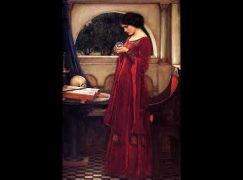If Wagner had been a woman…
mainSlipped Disc readers have come up with feminist endings for Tristan, Lohengrin, Carmen, Pelléas, Butterfly, Tosca, Bluebeard and more.
We especially like the pocket version of Pelléas:
GOLAUD: Oh! vous êtes belle.
MÉLISANDE: Ne me touchez pas! ne me touchez pas, ou je me jette à l’eau…
*plouf*
Read them all here and add one of your own.






Just imagine for a second if Jesus is a female in the Holy Bible….
Just curious: are we skirting the periphery or mocking feminism? I’m all for it, of course, but this whole concept of rewriting art for gender inclusivity sorta is a backhanded way of implying the current crop of ladies won’t turn out any great art – gotta use manmade stuff and reboot.
And if I’m way off the mark and this is all harmless fun, then I guess I’m keeping my perfect record intact of missing the point.
Lighten up. Feminism is no more immune from parody or satire than anything else. In fact, to say it’s off limits and cannot be mocked is, in itself, sexist.
The crazy thing is not feminism as such, but the application onto opera libretti, where already quite a dosis of craziness is the norm even without Regietheater intervention. There is a difference between politically-correct fanaticism and the necessary correction of mysoginist attitudes… but we cannot retroactively change opera plots to satisfy contemporary concerns.
In the Netherlands, Opera Spanga, an ‘alternative’ but adventurous boutique opera company in the countryside of Friesland all up in the north, a production of Don Giovanni was given with all the roles turned around: Donna Giovanna, and octrave transpositions upwards and downwards. For many people, the plot (and the music) worked equally well in comparison to the original gender distribution.
http://www.operaspanga.nl/en/productions/donna-giovanna/about-the-production/
“…ich berührte Alberichs Ring”…
If Wagner had been a woman, her life would have been quite different. She would have worn man clothes like George Sand, marry an incomprehensing dull office clerc, have an affair with Otto von Wesendock while living on his estate, have an affair with Liszt’s son Daniel, marry him blessed by his father, and from then onwards, things would have gone wrong: she would have tried an affair with King Ludwig but failed miserably, and – chased by creditors for unpaid bills for sports gear and expensive horses, as well as gym frequency – she would not have been saved by royal generosity. Daniel would have died early, and only half of the Ring would have been finished (ending with Brünhilde putting Wotan to sleep on the rock), and the manuscrits would fall to Schott in Mainz while she would go into hiding in a small village in the south of France, enter a monastery when old, and die as an embittered nun born too early.
Speaking of this Golaud line “Oh! vous êtes belle ! “, the Wiener Staatsoper offered in 1962 an interesting EU-oriented version of the libretto, which you can hear here:
https://www.youtube.com/watch?v=Mhfx_WVXrJk
(no editing – it really happened, Karajan conducting). Maybe the baritone was referring to the librettist’s origins…
It may be of some interest to know that Wagner was something of a ‘cross dresser’, walking around in luxury fantasy robes while working on the Ring and ordering expensive fabrics from his seamstress Bertha Goldwag in Vienna, who had to add a letter of explanation for the douaniers saying the fabrics were for a rich baroness in Germany. Wagner was so fond of women that he imitated their dress extravagances in private, so it seems he would have been a fervent advocate of women’s liberation as long as they would still keep him, by way of exception, on a pedestal high above them.
W’s letters to Bertha were found by a Viennese journalist who published them in a long series in his newspaper, encouraged by Brahms who thus got his revenge on Wagner who had written nasty things about him. The wave of hilarious mocking throughout the music world of the time greatly hurt Wagner, who saw in it a campagne by ‘the Jews’ to stop the success of his works and his Bayreuth undertaking. Menschliches, allzu Menschliches…. of a quite unusual kind.